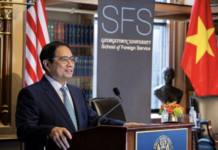![]()
With the Brazilian president’s arrival in Washington D.C. today, President Biden must ensure the optics of the encounter do not limit the discussion concerning the future of Brazil and its commitment to U.S. foreign policy goals as opposed to that of its adversaries.
Despite a seemingly successful shift away from the isolationist efforts of Bolsonaro, President Lula’s path of commitment to the alternative has raised eyebrows amongst Western leaders. Several concerns include criticism of munitions support to Kyiv, blame on Ukraine for continuing the war effort, opposition to Guaido’s claim of the Venezuelan presidency, the Iranian vice president’s presence during Lula’s inauguration and a further intermingling of the Brazilian economy with China. The international influence of U.S. adversaries may prove to be far too great of an opportunity to miss for the two-time president. Despite this temptation, President Biden must express the following points to bring Lula’s focus back in touch with US foreign policy goals, as well as to his promises for the people of Brazil.
With the recent protests in Brazil, the President finds himself in a situation of great instability. From a purely human rights perspective, growing relationships with autocratic leaders and totalitarian regimes of the like may prove to be the least effective strategy towards restabilizing the domestic political structure in Brazil. Over the past several months, Iran has faced massive protests following the murder of Mahsa Amini by the enforcers of shariah law, leaving an estimated 516 protesters dead. This devastation has only led to further mobilization of enraged opposition to the Iranian regime domestically and internationally. Additionally, Beijing’s response to protests dating back to Tiananmen Square have left a rather unsavory taste in the international community, only recently exacerbated in the utter brutality imposed by the regime against the Hong Kong protests of 2019 and 2020. Russia’s suppression of dissent in the face of Ukrainian backlash and Maduro’s violent response to those in denial of the election results only further intensify the necessity for Lula’s disassociation with these regimes, despite the potential benefits.
The temptation of doing business with these adversaries stems from Lula’s desire for a revitalization of the Brazilian economy. Beginning in 2002, Lula’s first run as president saw record growth in the economy. This success could be attributed to many factors, but a restructuring of the economy in the 1990’s and a decision to peg the Brazilian real to the dollar through the Post-Real Plan certainly played a role in stimulating the unprecedented growth. A shift towards the dollar allowed Brazil to avoid complete economic devastation from the 1997 Asian financial crisis and the Russian bond default in 1998. Lula’s economic success was largely dependent on the US economy, being their number one trade partner at the time. China has now usurped the US in this regard, leaving Brazil’s economy to now be largely dependent upon that of the Beijing regime. With a growing reliance on the “debt-trap” of the Chinese belt and road initiative, having left 40 lower-to middle-income countries with levels of debt exposure to China higher than 10 percent of their GDP and hidden debts totally $385 billion, Lula must remain weary of Brazil’s dependence on the economy of China.
Additionally, with no end in sight for the war, Putin’s efforts in Ukraine appear to only leave the Russian economy subject to further sanctioning and blocking of the US economy. Despite the historic level of sanctions, Putin has refused to capitulate or negotiate in any manner. Little more could be done in regards to sanctioning Russia from the US economy, leaving the option of enhanced secondary sanctions more salient than ever. Although the Brazilian economy does not depend heavily upon Russia’s nor its energy sector, Lula must be reminded of the threat of secondary sanctions as it pertains to dealing with the US’s adversaries. The necessity of Biden proposing such a threat comes not from Russia, but rather from Brazil’s trading with Iran, where exports to Iran from Brazil reached an all time high of $847.75 million in August of 2022. Secondary sanctions can and will devastate the Brazilian economy far more than its internal effect on the US, a point necessary in gaining compliance concerning Lula’s relationship with US sanctioned-nations.
Lastly, throughout his campaign, Lula established a stark difference between the way he and his opponent would assess and solve issues regarding preservation of the Amazon rainforest. Although the US has been far from perfect in the climate crisis and in environmental concerns as a whole, President Biden’s record towards clean energy in the Obama administration with historical limits on carbon pollution and the achievement of the Paris Climate Accords, as well as additional efforts promised in the Biden Plan, projects a far more credible commitment to the environment than those of Russia, Iran, Venezuela and China.












